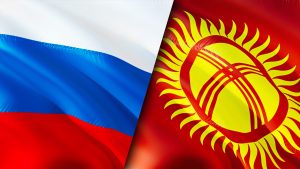On September 5, Kyrgyzstan’s Foreign Ministry warned Kyrgyz citizens against traveling to Russia. It’s Bishkek’s third such warning since the Crocus City Hall attack in March, after which Russian authorities intensified targeting of Central Asian migrant workers with increased regulations.
In a statement, the ministry urged Kyrgyzstan’s citizens to “temporarily refrain” from traveling to Russia unless they have “compelling reasons” to do so on account of the continuation of “additional security measures” and “enhanced control over the passage of foreign citizens across the state border.”
Previous warnings were issued in March and May.
Kyrgyzstan maintains close relations with Russia, but the last few years have presented particular challenges.
Almost immediately after Russia’s full-scale invasion of Ukraine in February 2022, reports emerged of Central Asians being coerced or lured into joining the Russian military. Those concerns deepened in September of that year when Moscow announced a partial mobilization, prompting Kyrgyzstan and most of the other Central Asian states to issue warnings to their citizens against participating in a foreign war.
The March 22 attack on Crocus City Hall, a concert venue in Krasnogorsk on the outskirts of Moscow, triggered an escalation in migration enforcement targeting Central Asians. The attack, in which four Tajik assailants killed 145 people, ignited a significant backlash against Central Asians in Russia more broadly.
Russia represents a major destination for Central Asian migrant workers and is of particular importance to the economies of Kyrgyzstan and Tajikistan. According to a December 2023 World Bank report, remittances to Tajikistan were equivalent to 48 percent of the country’s GDP (about $5.7 billion in 2023); remittances to Kyrgyzstan were equivalent to about 21 percent of GDP (about $2.6 billion in 2023). Millions of Central Asians travel to Russia each year; many of them to work in seasonal jobs or in construction, service, and manufacturing. Analysts point out that Russia’s economy in many ways relies on foreign workers, given its demographic decline.
Nevertheless, since the Crocus City Hall attack Russian legislators have pushed through a variety of new regulations.
In May, Kyrgyz President Sadyr Japarov raised labor mobility issues directly with Putin during a meeting of the Eurasian Economic Union’s Supreme Eurasian Economic Council. Japarov couched his comments within the parameters of the EAEU, ostensibly a customs union that ought to allow Kyrgyz citizens access to the Russian labor market.
“For the Kyrgyz Republic, issues of worker mobility are of fundamental importance, and therefore we call on you to prevent violations or deterioration of the provisions of the Treaty on the EAEU. We must not allow serious damage to the image of our association. It is necessary to strengthen the trust of our citizens and continue to work on the formation of a single labor market,” Japarov said.
In July, two bills were approved in the Russian State Duma. One requires military registration upon obtaining a Russian passport and introduces possible termination of citizenship upon failure to register for military service. The second bill introduced a new mechanism for deportation of migrants that circumvents a court procedure.
As those bills were being approved, Kyrgyz Deputy Foreign Minister Almaz Imangaziev met with the newly appointed Russian ambassador, Sergei Vakunov, to express concerns about the reported increased refusal of entry to Kyrgyz citizens at the Russian border. The Kyrgyz Foreign Ministry statement regarding the meeting, however, also stressed that “the Kyrgyz side understands the measures taken by the Russian side are aimed at ensuring security in the country.”
In late August, after the Russian bills were signed into law, the Kyrgyz Foreign Ministry issued a note explaining the new rules, particularly the new “expulsion regime,” which is technically slated to go into effect in February 2025.
The note urged Kyrgyz citizens to “put all their documents in order in the near future and settle all issues related to legal stay in the territory of the Russian Federation” in order to avoid being included in the “register of controlled persons,” which entails a host of restrictions and possible deportation.
The situation for Central Asian migrants in Russia does not look likely to improve any time soon, promoting some to consider alternative destinations. For example, as Agnieszka Pikulicka-Wilczewska reported last month for Meduza’s The Beet, a growing number of Uzbeks are opting to migrate to Poland in search of work, rather than Russia.
Politicians from Russia’s “A Just Russia – For Truth” party, meanwhile, have proposed a moratorium on granting Russian citizenship to Central Asians. That proposal isn’t likely to go anywhere, but it does underscore the artless contempt with which Russian nationalists view Central Asians.

































